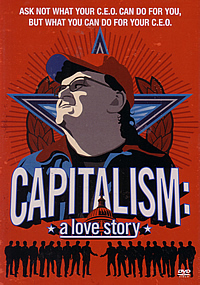SYNOPSIS:
On the 20-year anniversary of his groundbreaking masterpiece "Roger & Me," Michael Moore's "Capitalism: A Love Story" comes home to the issue he's been examining throughout his career: the disastrous impact of corporate dominance on the everyday lives of Americans (and by default, the rest of the world). But this time the culprit is much bigger than General Motors, and the crime scene far wider than Flint, Michigan. From Middle America, to the halls of power in Washington, to the global financial epicenter in Manhattan, Michael Moore will once again take filmgoers into uncharted territory. With both humor and outrage, Michael Moore's "Capitalism: A Love Story" explores a taboo question: What is the price that America pays for its love of capitalism? Years ago, that love seemed so innocent. Today, however, the American dream is looking more like a nightmare as families pay the price with their jobs, their homes and their savings. Moore takes us into the homes of ordinary people whose lives have been turned upside down; and he goes looking for explanations in Washington, DC and elsewhere. What he finds are the all-too-familiar symptoms of a love affair gone astray: lies, abuse, betrayal... and 14,000 jobs being lost every day.
MOVIE REVIEW:
Call him activist or provocateur- but there’s no denying that Michael Moore and his documentaries make for compelling viewing. It’s best to keep the two separate, for one has a personality quite different from the other.
The Michael Moore we see in “Capitalism A Love Story” goes right up to the headquarters of the corporate bigwigs in Wall Street, e.g. General Motors, AIG, Bank of America, to make a “citizen’s arrest”, knowing fair well that he would only be escorted out by security personnel. This is the same Michael Moore who subsequently takes a roll of yellow crime scene tape and places it around the buildings, just to make his point that crimes against the poor and the middle-income have been committed by these giant corporations.
Need he have resorted to these publicity stunts, you ask? Well, those who have seen at least one other Michael Moore documentary will know that the filmmaker pulls these off more for entertainment value than for anything else. Nevertheless, this rightfully should not and doesn’t ever diminish the point he tries to make and his agenda here is this- capitalism has overtaken democracy as the way of life in America, creating corruption, greed and gross social inequality, which inevitably precipitated the financial meltdown in 2008 and the destruction of the lives of many who were evicted from their property and left without a roof over their heads.
Like his previous works, Moore makes an impassioned point through his interviews with the Everyman- the Average Joes holding modest jobs and making ends meet- and their travails courtesy of the culture of avarice perpetuated by the banks and their persuasions to people to finance and refinance their property. It is the illumination of these individuals’ sad plights that inevitably provoke indignation- the people thrown out of their family homes after 20 years, and even more preposterously, the widow who realised after her husband’s death that his company had taken a health insurance policy on her husband (or “dead peasant insurance”) which earned the company a chunk of money after his passing.
What has America come to, Moore asks, if our political leaders aligned with the business magnates on Wall Street continue to champion capitalism religiously while ignoring the ill-effects of its consequences blatantly demonstrated in the predicaments of ordinary citizens? Of course, the timing of this couldn’t be more prescient, as the nation and its people begin to rebuild themselves after what was dubbed “the worst recession ever”.
One could of course criticise Moore for being overtly biased in his treatment of the subject- hey, no one complained before the bubble burst, right- but if you’re familiar with Moore, you’d already know that none of his works were particularly objective for that matter. More so for this topic, which Moore has said he has been researching for the past 20 years, indeed right from the beginning when he first entertained and informed audiences with his 1989 debut “Roger and Me”. “Capitalism” also features some scenes from that previous movie and there’s no doubting his fervour for his material.
In a rare show of support for the administration, Moore also expresses hope that Obama’s election to the presidency would bring about change to America, “change we can believe in”, he says. His solution to the ills and evils of capitalism is a return to democracy, to the principles by which the country was founded, alluding as well to the second Bill of Rights that Franklin Roosevelt had drafted just months before his passing. While this may seem a tad too simplistic as well, it is no less noble an ideal to strive towards.
Yes, despite his somewhat questionable showy tactics, Moore always has his heart in the right place and his finger on the hot-button issues of the day. If he needs to make a citizen’s arrest, or paste that yellow crime scene tape just to garner some attention to his cause, we for one are willing to indulge him; after all, it’s a message that needs to be heard by anyone and everyone for change to happen and we are more than willing for Moore to be its spokesperson.
SPECIAL FEATURES :
NIL
AUDIO/VISUAL:
The Dolby Digital 2.0 audio is clear enough for this documentary. Visuals are often grainy in parts but that’s due to the filming itself than the visual transfer of this disc.
MOVIE RATING:
   
DVD
RATING :

Review
by Gabriel Chong
Posted on 26 March 2010
|


